Filippos Tourlomousis is a mechanical engineer. His main research interests lie in the field of intelligence and robotics infrastructure for self-driving materials labs of the future (a.k.a. “robot scientists”). He is developing AI-driven autonomous materials engineering platforms that include novel 3D printing methodologies for the fabrication of lattice structures with resolutions spanning microns to cm length scales for energy and healthcare applications. With these new tools he has demonstrated a wide range of material systems ranging from 3D microscale biomaterial scaffolds capable of programming stem cell replication by pure manipulation of cell shape, to large-scale metamaterial morphing robots for hydrodynamic applications.
Filippos is an E14-fund fellow and the founder/CEO of Biological Lattice Industries, an early-stage biotechnology company that is developing an AI-driven robotic biofabrication platform for tissue engineering and regenerative medicine applications. In addition to that, he is the lead AI & ML engineer for Materiom, a non-profit organization that provides open data on how to make materials that nourish local economies and ecologies funded by Google’s Impact Challenge on Climate fund.
Filippos holds research affiliations with the Highly Filled Materials Institute (NJ, USA), where he completed his PhD and got the Excellence in Research Award for his contributions in processing of complex fluids. He also holds a research affiliation with the MIT Center for Bits and Atoms (CBA), where he was a Postdoctoral researcher for 4 years before joining Demokritos. Filippos has published in prestigious journals such as Science Advances and Microsystems & Nanoengineering, Nature. His work has been featured in Wired, the Economist, Nature Publishing Group, Nature China, MIT News, and the Vanguard by GE. Lastly, he has served as a reviewer for established journals such as Advanced Materials, Advanced Functional Materials, Advanced Engineering Materials, Biofabrication and others.

“Mediterranean Innovation Alliance for Sustainable Blue Economy”, NCSR-D Budget 138.5 k€
